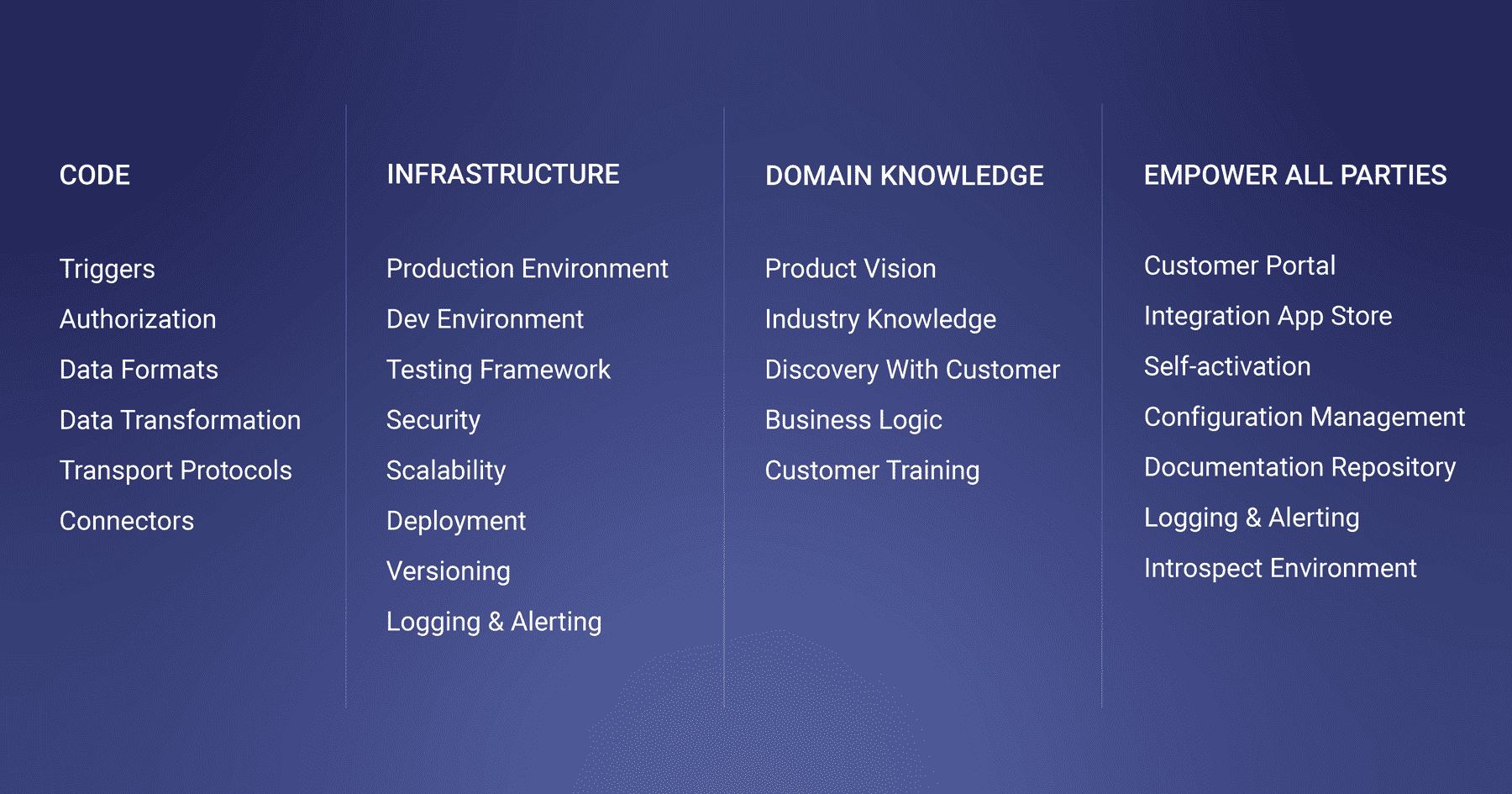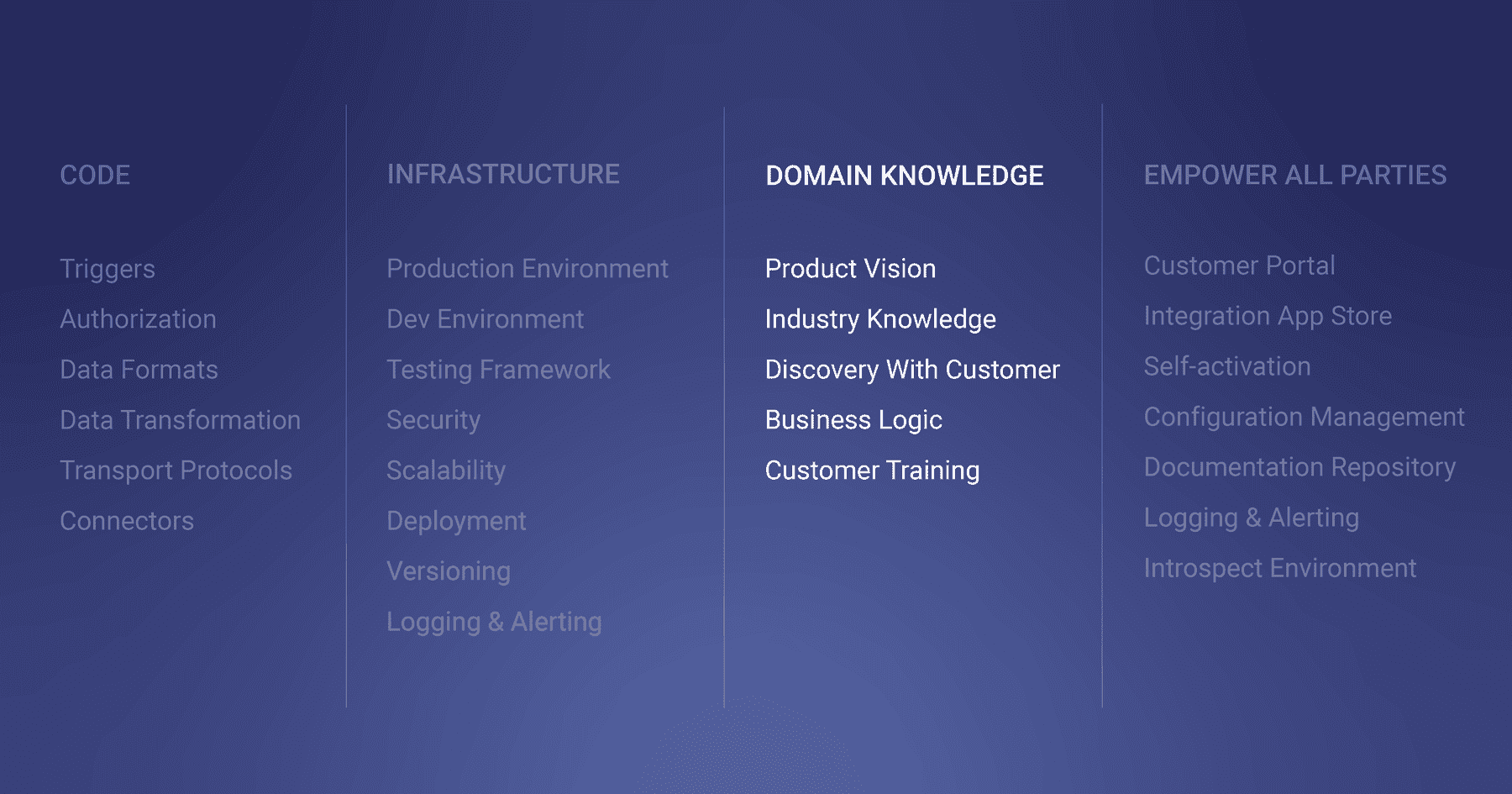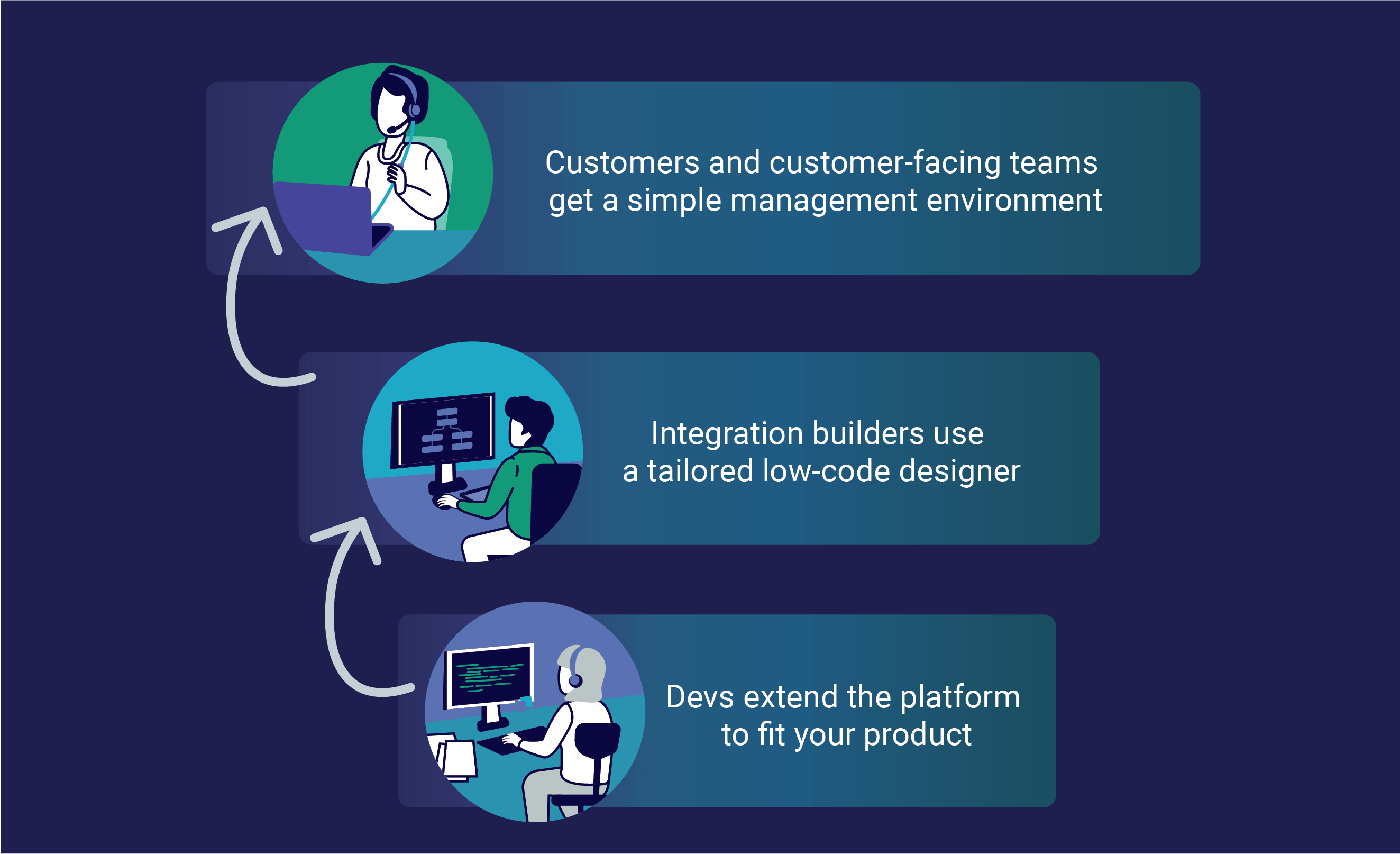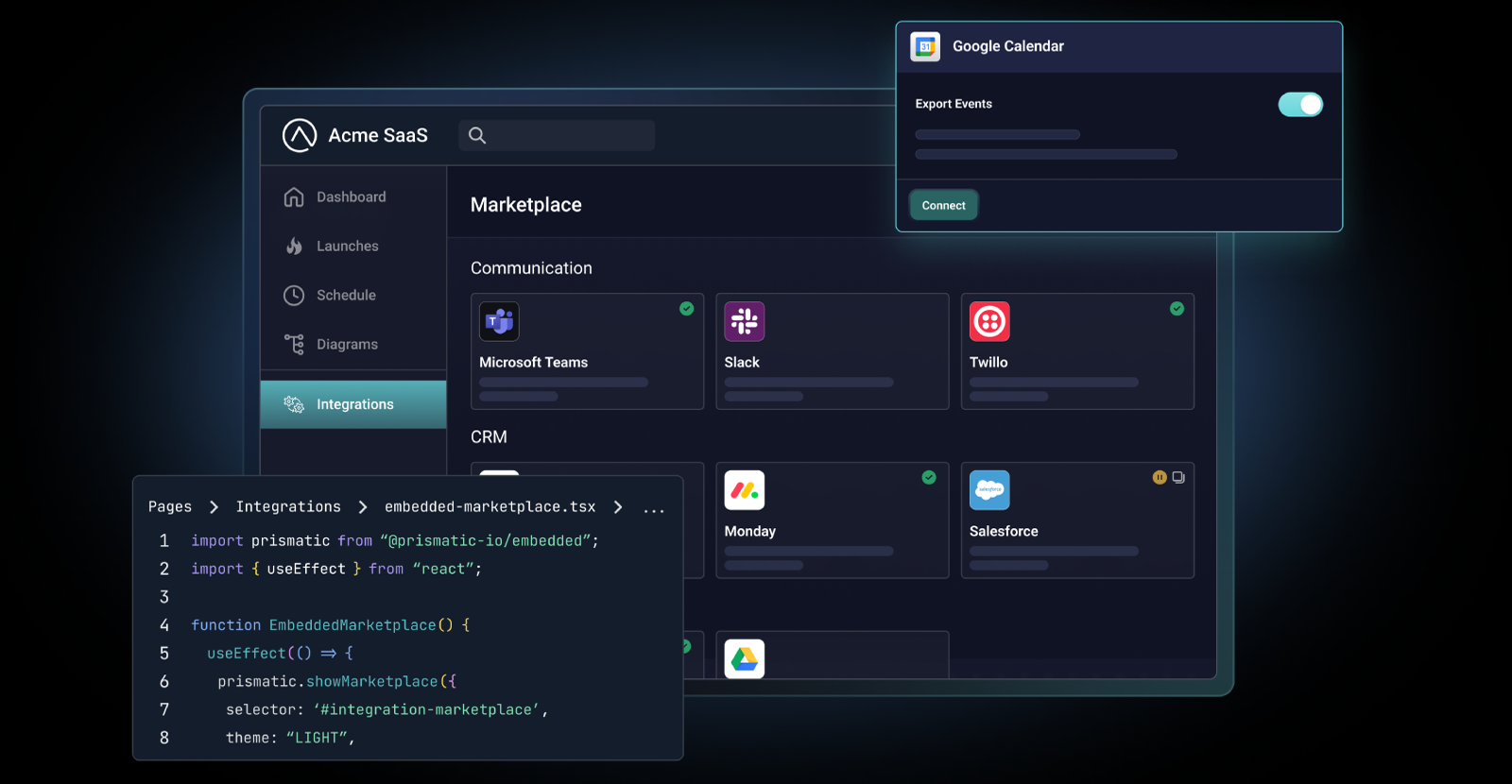At Prismatic, we believe B2B software companies need a better way to build and deploy integrations for their customers.
Here's an overview of the integration problem facing B2B software companies today and how Prismatic can help.
B2B software companies have an integration problem
Integrations have always been a hard problem for B2B software companies. They're more difficult to build, deploy, and support than they should be, and all of that work is extremely time consuming.
Two major trends are making the problem even bigger.
First, business customers are demanding more integrations. As software becomes more specialized, they're using more systems and expecting their software vendors to provide more integrations to connect them all.
Second, they're demanding higher quality integrations. Expectations for software are rising across the board – features and functionality, user experience, ease of setup. These heightened expectations naturally extend to integrations as well.
As a result, software companies today are spending more time and resources on integrations than ever before.
All of this leads to some big problems for software companies. Integrations eat up a lot of development time, distract from core product work, slow down sales and customer onboarding, and make it hard to respond quickly to market needs. And although companies spend a ton of time on integrations, most still struggle to provide the quality of integrations they want – as easy to configure, polished, reliable, and well supported as their core product features.
My cofounders and I know these problems all too well. We spent fifteen years at my previous company building B2B software with hundreds of integrations.
We built Prismatic to solve them.
Integrations are incredibly complex
As we started building, we talked with teams from all over the B2B software world. We wanted to learn everything we could about their integration challenges and needs.
One thing those conversations made clear is just how complex integrations are. There's simply a lot that must be done in order to provide integrations to customers. All those tasks and considerations group up into four categories of integration work:

Code. Integration code has to handle everything from triggering integrations to connecting with third-party systems. This includes triggers, authorization, data formats, data transformation, transfer protocols, and connectors.
Infrastructure. Standing up and maintaining an environment to run integrations is a heavy lift. Teams must also find a way to test integrations, manage deployment to customers, and get notified of issues in production. This includes a production environment, dev environment, testing framework, security, scalability, deployment, versioning, logging, and alerting.
Domain knowledge. This entails combining customer requirements with product and industry expertise to design workflows that meet customer needs. This includes product vision, industry knowledge, discovery with customers, business logic, and customer training.
Empower all parties. A final category of integration work is providing customers and customer-facing teams with the tools they need to manage integrations. This includes a customer portal, integration marketplace, self-activation, configuration management, documentation repository, logging, alerting, and the ability to introspect the environment.
It's no wonder integrations are so difficult and time-consuming.
There's an important takeaway from that list. Aside from items related to domain knowledge, most integration tasks have nothing to do with your core product. Things like authorization and testing frameworks and integration marketplaces are the same no matter what industry you work in. Those tasks should be abstracted as much as possible. That lets teams focus on work related to their core product, where they can add far greater value.

Traditional integration platforms have critical gaps for B2B software companies
There are dozens of integration platforms on the market, known as Integration Platform as a Service or iPaaS, that handle many of those tasks.
However, most were designed to help enterprises build integrations between the systems they use internally. They don't handle some of B2B software teams' most critical needs:
- They lack B2B-world concepts like customers (and their configurations and credentials).
- They lean too hard on a no-developer, low code mindset.
- They don't fit well into software teams' existing infrastructure and processes.
- They lack an embedded integration experience that can be provided to customers.
Because of those gaps, traditional integration platforms simply don't solve enough of the problem to be a compelling solution for most B2B software companies.
B2B software companies need a different kind of integration platform
Prismatic is a completely re-imagined integration platform. We built it from the ground up specifically for B2B software companies so we could holistically solve their integration problems. Our embedded integration platform as a service (embedded iPaaS) includes:
- An intuitive integration designer for building reusable integrations
- An embeddable, white-labeled integration marketplace with self-serve integration tools
- Integration deployment and support tools like customer-specific configuration, logging, and alerting
- Purpose-built infrastructure that runs your integrations in a secure, scalable environment
What sets Prismatic apart from other integration platforms?
Let's look at the factors that make Prismatic unique in the world of integration platforms.
Handles B2B-world concepts
First, Prismatic provides first-class handling for B2B concepts like customers and their unique configurations and credentials. It was specifically designed to help teams build productized, reusable integrations that can be easily deployed to multiple customers with different configurations.
Empowers every role with what they need
Prismatic was built with the whole software organization in mind. It gives each person involved with integrations exactly what they need:
- Devs get the power and flexibility to extend the platform. Developers build custom components, like domain-specific logic or connectors to niche systems, that extend the platform to fit your product and industry.
- Non-devs build integrations in a tailored low-code designer. Technical (non-developer) team members assemble reusable integrations and define their configuration UX using a low-code designer that's tailored to work for them.
- Customers and customer-facing teams deploy and manage integrations. Customers and customer-facing teams get productized integrations delivered in a sleek integration marketplace, and easy configuration and support tools.
This approach helps software companies use their time and engineering resources efficiently. Developers are primarily involved only where they have the biggest impact: creating custom components that extend the low-code environment to fit your product and industry.
This empowers non-developers to independently build, deploy, and manage integrations – huge swaths of work that have traditionally required extensive developer involvement – so that devs can focus on core product work. Prismatic further reduces developer workload by providing a purpose-built environment for running your integrations. Don't waste engineering time building and maintaining special infrastructure.
Fits the way you build software
Prismatic can be easily incorporated into your existing infrastructure and processes. The fully exposed API and robust CLI allow you to do things like keep integration definitions in your existing source control system, include them in your CI/CD pipeline, and feed Prismatic log events into your existing monitoring and alerting tools. We place huge focus on making Prismatic powerful, flexible, and developer-friendly at every turn.
Provides a first-class customer experience
Finally, Prismatic provides an integration marketplace that you can white label and embed in your platform. Customers can explore your integration offerings, self-activate and configure the ones they need, and use self-service tools like logging, monitoring, and alerting - all without leaving your app. Our embedded integration platform as a service makes it easy to add these features as a seamless, native-feeling part of your product, letting you provide a first-class integration experience to your customers with a fraction of the effort of building it yourself.
Embedded integration platform as a service
Prismatic brings all of this together in a complete solution, giving B2B software companies an easier way to build integrations and provide a first-class integration solution to their customers.
If "the integration problem" sounds familiar and you're interested in how Prismatic can help, contact us. We'd love to provide a custom demo tailored for your organization.



